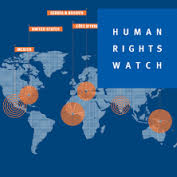Rights Under Attack: Dozens of Activists, Journalists Face Long Prison Terms

Essential human rights, and particularly the right to free speech, were under attack in Iran in 2016, Human Rights Watch said today in its World Report 2017. Unelected bodies, including Iran’s Guardian Council and the judiciary, undermined a number of government officials and members of parliament’s minimal efforts to defend citizens’ rights, and they regularly overstepped their legal mandates in committing these violations.
The security apparatus, especially the Revolutionary Guard Corps intelligence unit, and the judiciary cracked down on citizens for attempting to exercise their rights. Hard-line factions brought about the arrest of several Iranian dual nationals and journalists, accusing them, without providing any evidence, of being part of a so-called “infiltration network” allegedly led by the West to influence the country and its core values. Dozens of other activists, human rights defenders, and social media users were arrested for expressing peaceful dissent, particularly on social media. Revolutionary courts have handed down increasingly harsh prison sentences to activists – more than 10 years in some cases.
“Security forces and the judiciary have become the primary obstacles to justice in Iran, in contradiction to their stated purpose of upholding justice,” said Sarah Leah Whitson, Middle East director at Human Rights Watch. “Undermining citizens’ basic freedoms and overriding their legal protections signify a lack of confidence in their own ability to govern with legitimacy.”
In the 687-page World Report, its 27th edition, Human Rights Watch reviews human rights practices in more than 90 countries. In his introductory essay, Executive Director Kenneth Roth writes that a new generation of authoritarian populists seeks to overturn the concept of human rights protections, treating rights as an impediment to the majority will. For those who feel left behind by the global economy and increasingly fear violent crime, civil society groups, the media, and the public have key roles to play in reaffirming the values on which rights-respecting democracy has been built.
Despite an initial slowdown in executions in the first months of 2016, according to official sources, authorities had executed 203 people as of October 25, with rights groups estimating the real number to be as high as 400. Initiatives introduced to the parliament in December 2015 to eliminate the use of the death penalty for nonviolent drug offences did not move forward. On November 23, 2016, members of parliament introduced a new draft legislation to merely limit the use of the death penalty for nonviolent drug offenses.
On August 2, Iran executed, on charges of “enmity against God,” at least 20 alleged members of a group authorities consider a terrorist organization. Rights groups believe that they were among 33 Sunni Kurdish men arrested in 2009 and 2010, and sentenced to death in unfair trials after being abused and tortured in detention.
Iranian women face discrimination in personal status matters related to marriage, divorce, inheritance, and child custody. On July 31, 2016, President Hassan Rouhani suspended the hiring exam for public sector jobs to investigate apparent discrimination against women in the job market.
The government restricts religious freedoms and denies Baha’is the right to practice their religion. The government also restricts cultural as well as political activities among the country’s Azeri, Kurdish, Arab, and Baluch minorities. In August, however, participants in the national entrance examinations for universities in Iran were allowed to choose Kurdish and Turkish languages as their majors at the bachelor level.
In 2016, numerous prominent human rights defenders and activists, including Narges Mohammadi, Mohammad Seddigh Kaboudvand, and Abdolfatah Soltani, remained behind bars. The prominent opposition figures Mir-Hossein Mousavi, Zahra Rahnavard, and Mehdi Karroubi have been under house arrest without charge or trial since February 2011.